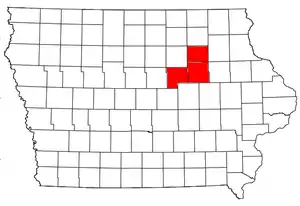Waterloo – Cedar Falls metropolitan area
The Waterloo–Cedar Falls Metropolitan Statistical Area, as defined by the United States Census Bureau, is an area consisting of three counties in Iowa, anchored by the cities of Waterloo and Cedar Falls. As of the 2000 census, the MSA had a population of 163,706 (though a July 1, 2009 estimate placed the population at 164,913).[1] As of the 2010 Census, the MSA had a population of 169,484.

Counties
Communities
Places with more than 50,000 inhabitants
- Waterloo (Principal city)
Places with 25,000 to 50,000 inhabitants
- Cedar Falls (Principal city)
Places with 10,000 to 25,000 inhabitants
Places with 1,000 to 10,000 inhabitants
- Conrad
- Denver
- Dike
- Elk Run Heights
- Evansdale
- Grundy Center
- Hudson
- Janesville
- Jesup (partial)
- La Porte City
- Reinbeck
- Sumner (partial)
- Tripoli
Places with 500 to 1,000 inhabitants
Townships
Demographics
As of the census[2] of 2000, there were 163,706 people, 63,527 households, and 41,855 families residing within the MSA. The racial makeup of the MSA was 90.62% White, 6.29% African American, 0.15% Native American, 0.86% Asian, 0.04% Pacific Islander, 0.75% from other races, and 1.29% from two or more races. Hispanic or Latino of any race were 1.56% of the population.
The median income for a household in the MSA was $39,163, and the median income for a family was $48,108. Males had a median income of $33,119 versus $22,549 for females. The per capita income for the MSA was $19,075.
See also
References
- "Table 1. Annual Estimates of the Population of Metropolitan and Micropolitan Statistical Areas: April 1, 2000 to July 1, 2009 (CBSA-EST2009-01)" (CSV). 2009 Population Estimates. United States Census Bureau, Population Division. 2010-03-23. Retrieved 2010-03-25.
- "U.S. Census website". United States Census Bureau. Retrieved 2008-01-31.